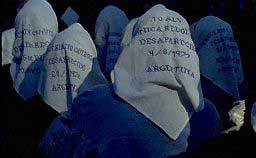REQUIRED
-
Samuel P. Huntington, "The Torturer Problem" in
The Third Wave: Democratization in the Late Twentieth Century
(Norman: University of Oklahoma Press, 1991), p. 211-31.
-
Samuel P. Huntington, "The Praetorian Problem,"
in The Third Wave: Democratization in the Late Twentieth Century
(Norman: University of Oklahoma Press, 1991), p. 231-53.
-
Alfred Stepan, Rethinking Military Politics:
Brazil and the Southern Cone (Princeton: Princeton University
Press, 1988), p. 68-145.
-
Wendy Hunter, "Politicians against Soldiers: Contesting
the Military in Postauthoritarian Brazil," Comparative Politics,
July 1995 (27):425-43.
-
Consuelo Cruz and Rut Diamint, "The New Military
Autonomy in Latin America," Journal of Democracy, October
1998, 8 (4):115-27.
-
Deborah L. Norden, "Democracy and Military Control
in Venezuela: From Subordination to Insurrection," Latin American
Research Review, 1998, 33 (2):143-63.
- Larry Rohter, "Ecuador's Coup Alerts Region to a
Resurgent Military," The New York Times, January 30, 2000.
RECOMMENDED
-
The New York Times, Editorial, "Ecuador's
Endangered Democracy," January 25, 2000.
-
The New York Times, Larry Rohter, "Bitter
Indians Let Ecuador Know Fight Isn't Over," January 27, 2000.
-
Juan Rial, "Armies and Civil Society in Latin America,"
in Larry Diamond and Marc F. Plattner, eds., Civil-Military Relations
and Democracy (Baltimore: Johns Hopkins University Press, 1996),
p. 47-66.
-
Louis A. Goodman, "Military Roles Past and Present,"
in Larry Diamond and Marc F. Plattner, eds., Civil-Military Relations
and Democracy (Baltimore: Johns Hopkins University Press, 1996),
p. 30-43.
-
José Nun, "The Middle Class Military Coup Revisited,"
in Abrahama Lowenthal and J. S. Fitch, Armies and Politics in
Latin America (New York: Holmes and Meier, 1976): 59-95.
-
Juan E. Mendez, "Accountability for past abuses,"
Human Rights Quarterly, May 1997, 19 (2):255-82.
-
Alain Rouquié, "Demilitarization and the Institutionalization
of Military-Dominated Polities in Latin America," in Guillermo O'Donnell,
Philippe C. Schmitter, and Laurence Whitehead, eds., Transitions
from Authoritarian Rule: Comparative Perspectives (Baltimore:
Johns Hopkins University Press, 1986): 108-136.
-
Jorge I. Dominguez and Abraham F. Lowenthal, eds.,
Constructing Democratic Governance: Mexico, Central America,
and the Caribbean in the 1990s (Baltimore: Johns Hopkins University
Press, 1996), p. 3-63, 135-158 (Nicaragua, El Salvador, Guatemala,
and Haiti).
-
Lawrence Weschler, A Miracle, A Universe: Settling
Accounts with Torturers (Chicago: University of Chicago, 1990).
Abraham F. Lowenthal and J. S. Fitch, Armies and Politics in Latin
America (New York: Holmes and Meier, 1986).
-
Michel S. Laguerre, The military and society
in Haiti (Knoxville: University of Tennessee Press, 1993).
- Jorge I. Dominguez and Abraham F. Lowenthal, eds.,
Constructing Democratic Governance: Mexico, Central America, and
the Caribbean in the 1990s (Baltimore: Johns Hopkins University
Press, 1996), p. 3-63, 135-158 (Nicaragua, El Salvador, Guatemala,
and Haiti).
LITERARY OVERLAY
- The movie Z: A Political Tragedy in Greece.
|

General Pinochet after the 1973 coup, General Pinochet
retired, mass arrests in the streets of Santiago, Mother demonstrating
at the Plaza de Mayo (Buenos Aires, Argentina).

Mothers of the disappeared hold a
vigil in Argentina.

Chilean army unit.
|
![]()
![]()
![]()
![]()
![]()